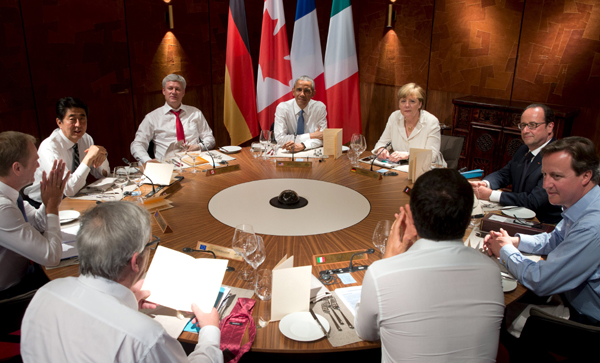The G7 meeting: what's possible and what's likely
Updated: 2016-05-26 13:28
By Adam Slater(China Daily)
|
|||||||||
 |
|
Leaders from the Group of Seven (G7) industrial nations hold a working dinner in the Bavarian village of Kruen, Germany June 7, 2015. [Photo/Agencies] |
G7 summits are generally the subject of a good deal of market speculation, but rarely produce much in terms of concrete action. Expectations for the summit of May 26-27 have been raised, however, by the G20 summit in February.
In particular, there has been much speculation that the February G20 meeting led to a behind-the-scenes deal to weaken the US dollar. This would help the US economy and also reduce the risk of a further sharp depreciation of the Chinese Renminbi (RMB) against the dollar: in a weaker dollar environment the Chinese currency can stay broadly stable against the dollar but depreciate "by stealth" on a trade-weighted basis without triggering negative financial market side-effects.
We doubt such an agreement on currencies occurred: currency moves since February look like continuations of earlier trends. But there are important exchange rate issues that the G7 could look at. One of these is the strong appreciation of the yen over the last year, which threatens to push Japan back into recession. Yen strength has prompted some noises from Japanese policymakers about currency intervention, could the G7 give Japan the green light for this?
Another issue relates to the Chinese RMB. The RMB has depreciated since February against a basket of currencies, but only modestly: has this been enough to dissipate devaluation pressures or is there a need to leave space, via a weaker dollar, for the RMB to ease further?
On the monetary policy side, the G7 might consider whether recent policy loosening efforts are bringing the desired results. The evidence suggests recent monetary steps have had mixed results – especially moves to negative interest rates. The G7 could hint at the curtailment of this particular monetary experiment.
Another issue is how the consequences of a Fed rate rise in June might be managed. Such a hike could restart financial market volatility, especially if it is perceived as a policy error. How can this risk be minimised?
Finally is there a role for a coordinated fiscal policy effort to boost world growth? Fiscal policy in the G20 as a whole is set to be moderately expansionary this year but contractionary next. Arguably, next year's planned fiscal tightening makes little sense given the sluggishness of world growth.
In our view, there is scope for some important countries to loosen policy, including Germany, Canada and South Korea. A concerted fiscal effort by governments might also help underpin private investment.
Japan is planning a substantial fiscal tightening in 2017 by raising its consumption tax. We believe this makes little sense given the weak state of the Japanese economy and we expect the tax rise to be delayed to 2019. Japan's fiscal accounts are in a mess, so a delay does risk an adverse market reaction. The G7 could reduce this risk by folding Japan's consumption tax rise delay into a broader announcement to use fiscal measures to support world growth.
How likely is it that the policy agenda we have outlined so far will be acted on at the G7 meeting? On the currency side, our best guess is that the G7 stops short of giving Japan the go-ahead for currency intervention but there may be a statement expressing concerns about yen strength. We also doubt there will be explicit comments implying a preference for a further RMB weakening
On the monetary side we think there is a chance the G7 will signal a retreat from using negative interest rates, though their language is likely to be cautious.
On the fiscal side, the G7 could provide some "cover" for Japan to delay the consumption tax rise. But a broader agreement on fiscal policy is unlikely. A key blockage to any broader fiscal effort is Germany. Although Germany's fiscal accounts are in good shape, there is very strong political resistance to significant fiscal easing there.
There is a considerable risk that none of the policy elements we have identified end up in the G7 statement and that we get a rather empty form of words instead. Given the sluggishness of world growth and the pressing need to tackle a number of obvious imbalances, this would represent a missed opportunity.
The author is the lead economist at the Oxford Economics
Related Stories
Meddling not to help G7 plug clout drain 2016-05-26 11:13
G7 cannot speak for all on DPRK nuclear issue 2016-05-26 07:48
Japan's South China Sea maneuvering at G7 Summit a 'clumsy show' 2016-05-25 17:02
Other G7 countries shouldn't blindly follow Japan, US agenda 2016-05-25 16:14
Today's Top News
Four Chinese banks among world's 10 largest
Kiev swaps Russian detainees for Ukraine's Savchenko
Refugees relocated during major police operation
China calls for concerted anti-terror efforts
London's financial centre warns of dangers of Brexit
Russia blasts NATO for Cold War mentality
Vietnam, US adopt statement on partnership
Alibaba expands in Belgium amid protectionism
Hot Topics
Lunar probe , China growth forecasts, Emission rules get tougher, China seen through 'colored lens', International board,
Editor's Picks

|

|

|

|

|

|







